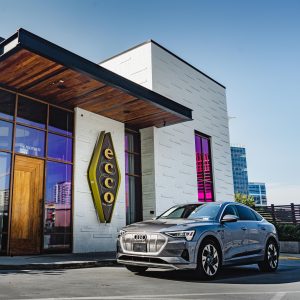Myths about EVs

***This content is sponsored by Audi Atlanta***
As many automakers begin phasing out internal-combustion engines, most are setting target dates to go all-electric within the next decade or so. Audi, for example, has pledged all new models will be electric by 2026, and the internal combustion engine totally phased out by 2033. A handful of governments have promised to help the transition with incentives. These are only targets, and they could change — but it appears that the days of burning gasoline or diesel in your personal car may be ending. Still, a handful of myths persist about electric vehicles.
Myth No. 1
EVs are good for in-town driving but aren’t practical for road trips.
We pretty much busted this myth a while back in our previous summer road trip blog. Range anxiety is real but using the Audi e-tron as an example, the 2021 e-tron has an estimated range of 220 miles and is equipped with industry-leading 150kw charging. What does that mean? Basically, you can get an 80% charge, or about 160-mile range, in 30 minutes.
Afraid you won’t be able to find a charger while on the road? Don’t be. The charging infrastructure has seen tremendous growth, and more and more are being built. The bottom line? With a growing network of charging stations across the country, technological achievements in charging capabilities and range, as well the comfort, power, and style of modern EV’s, owning an EV is for much more than just city commuting.
Myth No. 2
EVs are just as bad or worse for the environment as gas-powered vehicles.
Many EV skeptics argue that they’re just as damaging for the environment as gas-powered cars, claiming that green isn’t always clean. Between sourcing raw materials, manufacturing, shipping, selling, and servicing, the vehicle industry can be harmful for the Earth. Building an EV means doing all that, as well as procuring and processing lithium and other elements by means that can have a harmful impact on the planet. And that doesn’t even factor in the environmental impact of producing the electricity to charge your EV.
As we explored in our last blog, over time, an EV is the better environmental option when compared with fossil-fueled vehicles. EVs don’t directly emit carbon dioxide or any of the tailpipe emissions. While a fossil-fueled vehicle keeps polluting throughout its life, the average EV makes up for the higher environmental cost of its production within the first few years of ownership. As the power grid shifts to use more renewable energy, EVs look even better. Owners can even charge them at home using solar panels (check out Solarize Atlanta for your home). Meanwhile, every inch traveled in a fossil-fueled vehicle means burning more gas and pumping more toxic chemicals and carbon dioxide into the air. And when the environmental impact of the oil industry is considered EVs come out even further ahead. Oil production is a resource- and energy-intensive process that comes with a decades-long list of human and environmental costs.
Yes, getting lithium is ugly and sometimes energy production for charging isn’t as clean as we’d like, but EVs come out ahead of the procurement of oil for fossil-fueled vehicles.
Myth No. 3
Electric vehicles are way more expensive than fossil-fueled vehicles.
EV’s aren’t necessarily pricier than the equivalent gasoline vehicles and you don’t have to spend $160,000 on an Audi RS e-tron GT to enjoy the benefits of switching to electric (though if you can afford it… it’s amazing).
The fully electric 2022 Audi Q4 e-tron is arriving this fall at a starting price of $43,900, making an EV more accessible than some may imagine. If you look to a similarly sized Audi Q3 crossover SUV, with a starting price of $35,900, you might point to the $8,000 difference as proof of the myth.
But the existing federal tax credit for EVs gives most buyers $7,500 back. That puts the price of the electric Q4 at $36,400, only $500 more than the fossil fueled Q3. For 2021, manufacturer’s vehicles that qualify for a federal tax credit include: Audi, Bentley, BMW, Chrysler, Ferrari, Fiat, Ford, Honda, Hyundai, Jaguar, Jeep, Karma, Kia, Land Rover, Lincoln, Mercedes-Benz, Mini, Mitsubishi, Nissan, Polestar, Porsche, Smart, Subaru, Toyota, Volkswagen, Volvo.
As of early last year, when cars were cheaper and easier to find, the average transaction price for a new vehicle was nearly $40,000, according to Kelley Blue Book. The starting price of the all-electric Audi Q4 slides under that average. And as EVs get more popular, batteries should continue to get better and cheaper — which should mean better and cheaper EVs, which should mean they get even more popular.
Costs from fuel to maintenance are lower in EVs, which makes them more affordable over time.
Learn more about EVs by visiting our EV page.
About Audi Atlanta – Audi Atlanta is a Jim Ellis Family Dealership servicing the Atlanta area and beyond since 1983. The facility delivers about 1,800 new and 1,000 Certified Pre-owned Audis annually with a robust inventory to meet the demand. Audi Atlanta is the nation’s #1 Certified Pre-owned Audi dealership for 12 of the previous 13 years and 2019 and 2020’s #1 Audi Sport dealer in the nation. This Audi Magna Society dealer has been awarded that title for 15 years total and 4 of those prestigious honors were Audi Magna Elite. Learn more about the Audi e-tron by visiting: audiatlanta.com








